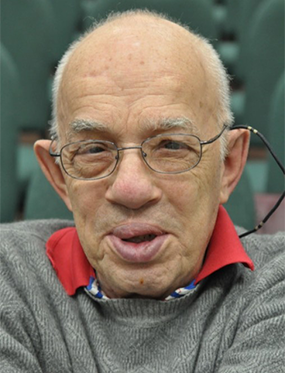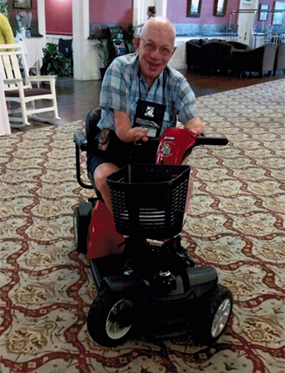10/02/2015
Survivor with Disabilities Finds New Home
- Share This Story


At age 77, Teddy won’t give up his fight to live life on his own terms. Although his disabilities have worsened with age, his spirit is just as strong. When he wanted to find a new home where he could live out his final years with as much independence as possible, near the family that means so much to him, Federation was there to help.
“Now that I’m getting older, I’m unable to tie my shoes. At mealtime, my meat has to be cut,” Teddy said. But, thanks to Federation-supported senior housing, Teddy can be more active. “I can feel independent but at the same time I’m being helped,” he said.
Teddy’s favorite activities include helping call bingo, preparing the community newsletter and participating in a writing group, plus working weekly in the general store.
He takes advantage of group day trips to museums and other venues and is involved in leisure groups. “I figure there’ll come a time when I won’t be able to enjoy such offerings,” he said. “So why not do it now?”
And because Federation-supported senior housing is right near family, Teddy gets to see his son and grandchildren every week. He is one of the lucky ones.
Compared to other seniors in the U.S., Holocaust survivors are at a significantly higher risk for poor physical and mental health, depression and social isolation. This is one of our most vulnerable populations.
An estimated 1,100 survivors are in Cleveland, 100,000 are in the U.S., and tens of thousands are around the world. 25% are estimated to live in poverty, and 20% are both poor and disabled.
Federation is a lifeline to basic needs like food, medicine, and home care, plus social interaction and transportation needs – whether survivors are living locally, nationally or internationally, our Cleveland community is there to help this vulnerable population age with dignity.
And, with dignity, Teddy and several fellow survivors speak publicly about their experiences during the Holocaust, usually to school groups and young adults.
“I think that children should know what went on so it shouldn’t recur,” said Teddy. “They ask a lot of questions and I try to answer the best I can.”
With Federation’s help, Teddy will continue spreading that message for as long as he can. You can read his story of courage below.
Teddy's Story of Survival:
The Germans never expected that I would be an underground man
When the Nazis invaded Austria in 1938, Teddy’s parents sent him to Belgium with his grandmother. In 1940, the two moved to France, where they became separated during a bombing raid. Given Teddy’s physical disabilities and his inability to speak French, an ambulance crew “thought I was mentally unstable and placed me into an insane asylum,” he recalls. When he asked for paper and pencil to write a letter to his parents, asylum staff realized his abilities and placed him instead in a Catholic orphanage.
Teddy stayed there for two years, getting a “good education” and becoming fluent in French. But when nuns tried to convert him, “I refused,” he says, choosing instead to run away to a nearby French Underground cell he had overhead the nuns discussing.
Just 12 years old at the time, he served as a courier. “I was a messenger boy,” he says. “One of my shoes is higher than the other, so the cobbler was able to make a hole in the sole of the shoe and they placed the messages in it. Since I was disabled, the Germans never expected that I would be an underground man so they never stopped me.”
The scariest time, he remembers, was hearing the incoming bombs. “There’s a whistling sound,” he says. “And if the sound passes you, you know you’re safe.” The bomb will land elsewhere.
He served with the underground until liberation, eventually making his way to the United States, where he completed his education and worked 35 years as a city clerk.
Stories like Teddy’s are made possible by your generosity to the Campaign for Jewish Needs. Join us as we aspire to leave no community member behind in Cleveland, Israel, and 70 Countries around the globe. Donate today.


Comments